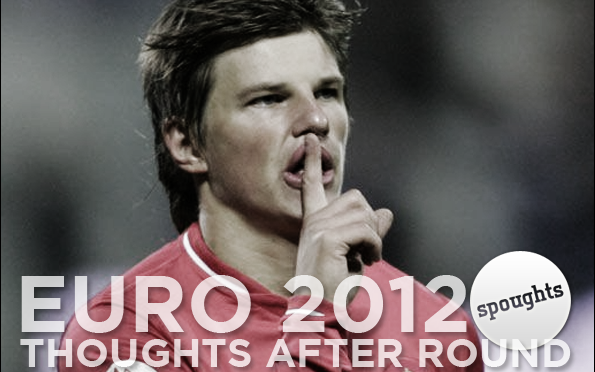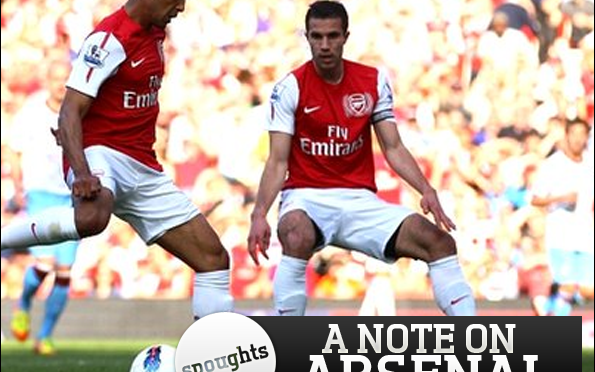The Major Thought: Andrei Arshavin
Euro 2008 was, in the eyes of many, the Andrei Arshavin tournament. Coming back into a Russian side after a few games, completely refreshed, Arshavin blitzed the competition, and became one of the hottest properties on the world footballing market. Linked to clubs around the world, Tottenham Hotspur and Barcelona to name a few, Arshavin would eventually become embroiled in an ongoing transfer saga with Arsenal that was only settled with the shattering of Arsenal’s record transfer fee. To the British Isles came this tiny Russian, with the world watching and expecting. They knew he possessed the skill at his feet. They had seen it displayed repeatedly in Austria and Switzerland.
It took a mere two months for Arshavin to show his true ability. Liverpool at Anfield has remained a supposedly difficult fixture, but teams as varied as Wigan and Fulham picked up points there this season. Yet in the year that Arshavin defined the early part of his Arsenal career, Liverpool were an entirely different side. They were second in the league at the end of the season, having genuinely pushed Manchester United all of the way. At Anfield, they had picked up 43 points out of a possible 57, a staggering sum. And Arshavin ripped them to shreds. His team around him faltered, but Arshavin was the focal point in a display that has since slipped into legend. Four goals. An incredible number, even if we discount the fact that it occurred at one of the hardest stadiums to play at, against one of the top two teams in the nation that season. Bad players do not do that.
It’d be entirely reasonable to suggest he’s gone off the boil a bit since then. In fact, the most accurate description of his performances at Arsenal this season would be suggesting they are akin to a particularly disgruntled badger who has awoken one day to find it’s feet have been tied together with a ziplock. Furthermore, said badger hasn’t been able to do any exercise, any attempts hindered by the aforementioned ziplock. It has also chosen to dedicate exercise time instead to the consumption of pasties.
However, reports from the mystical land known as Eastern European football suggested that, in fact, Andrei was doing alright back at Zenit. A change of scenery, or perhaps a return to previous pastures was all he needed. On the other hand, more reasonably, I would like to hypothesize that what Andrei Arshavin actually needs is to be played in his correct position. Insanity, I am completely aware.
People are often accused of being as stubborn as a mule. When it comes to pigeonholing players, Arsene Wenger is about as stubborn as a tree that has been placed atop that character in a film you know just isn’t going to survive. And there are zombies coming over the hill. You can hear the groans. Wenger decided Arshavin would be a left winger, and a left winger he shall be. We’ve already covered his thoughts regarding Walcott.
Admittedly, Arshavin’s good performance this week against the Czech Republic came out on the left hand side, but there was a noticable difference about it. The play fed through him. He didn’t need to beat men, just receive the ball and feed it. Arshavin is, I believe, and I will readily accept heavy criticism on this, in reality a playmaker. For Arsenal, he should probably be operating more centrally. This is on the back of one real performance that impressed me at the Euros, but he is a man to watch for the rest of the tournament. 2012 could once again be the year of Andrei Arshavin.
Little Thoughts about Sport #1: Holland
Take heed, Holland, a loss in the first game is not the end of it all. Spain at the World Cup, for example. Yet the act must be brought together soon, especially directly in front of goal. The sheer profligacy of the strike force was incredibly disappointing, Van Persie immensely impotent after such a prolific season domestically. Ties against Germany and Portugal seem vastly less simple than one against Denmark, yet I’d still back them to go through and go far. The football is certainly good enough. Just sort out the shooting.
Little Thoughts about Sport #2: The Back Three
Italia. Mamma Mia. You know how to, how you say, stifle a false nine, no? Danielle De Rossi was employed with aplomb in a back three against the Spanish, playing very much in a role that I expect to become far more common in world football. Pep Guardiola used Javier Mascherano in this role this season, but rarely, as it relied on all of his preferred back three being fit. You may begin to notice a trend of the defensive midfielder dropping deeper, being used to launch attacks, but still being part of a true back three. Exciting tactical times.
Little Thoughts about Sport #3: England
It would be remiss to not consider England. Are the team as bad as I thought beforehand? Admittedly, a draw against one of the favourites is nothing to scoff at, but there are some caveats. Key players like Yann M’Vila are out for France, and set-pieces were always going to be a threat with France’s weakened back two. England did not seem entirely outclassed, which was obviously a bonus, but I would not yet become excited over a draw earned through a well worked set piece.
Follow Amitai Winehouse on Twitter @awinehouse1




